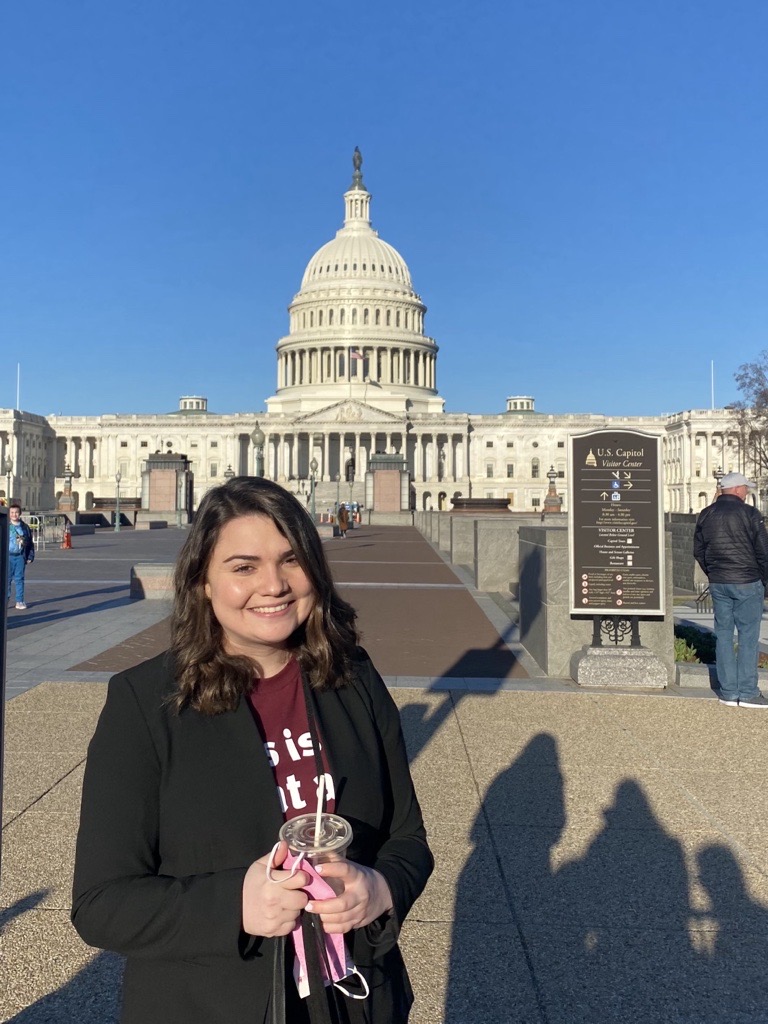This post was written by Health Law and Policy Clinic student, Ali Gentry ’23
As a student attorney at the Health Law and Policy Clinic this semester, I worked on various projects aimed at promoting and protecting access to health care through Medicaid. As part of this work, I had the privilege of attending the AIDSWatch Conference in Washington, D.C., one of my most formative experiences of law school. There, I had the opportunity to meet and learn from powerful advocates from across the country and to refine my advocacy skills by discussing Medicaid with legislative staffers. This experience caused me to reflect on the importance of ensuring that my work as an attorney is informed by and in collaboration with the voices and input of grassroots advocates.

AIDSWatch is an annual, constituent-based HIV advocacy event organized by AIDS United, the U.S. People Living with HIV Caucus, and the Center for Health Law and Policy Innovation at Harvard Law School. The event brings together people living with HIV and their allies to discuss issues facing the community, build power as advocates, and push for the AIDSWatch Policy Priorities on Capitol Hill.
AIDSWatch builds on The Denver Principles (1983), a courageous manifesto declaring the rights of people with AIDS and demanding person-centered responses to the epidemic. The advocates demanded to be included in efforts to develop care systems and policies to address the epidemic; they called for programming to be shaped by people with AIDS instead of simply for people with AIDS. Today, advocates describe this principle as the “Meaningful Involvement of People with HIV/AIDS,” referred to as MIPA. MIPA is based on the idea that grassroots advocates, meaning community members directly affected by policies, are the subject matter experts and should be involved throughout decision-making processes. The MIPA philosophy produces person-led, sustainable advocacy movements with shareable power.
MIPA also leads to more responsive planning and better policymaking. For example, a panelist at AIDSWatch explained that community-led bills and programs often get more support from people living with HIV, and are more successful in achieving their purposes, than professional advocate- or legislative office-led proposals. Additionally, speakers at AIDSWatch emphasized that advocacy is most effective when professional and grassroots advocates collaborate in weaving together the stories of community members with the technical information of professional advocates—because real power lies in lived experience, not only in legal arguments and statistics. To that end, I am more aware now that in addition to providing legal expertise and services, attorneys in social justice movements have the equally important responsibilities of developing community advocacy capacity and expanding meaningful participation in the movement, including supporting grassroots advocates in becoming movement leaders.

Attending AIDSWatch opened my eyes to the importance of using the knowledge, connections, and privileges that come with a Harvard Law School degree to uplift grassroots voices. I hope to use my own knowledge and power to support and strengthen the power of the communities I work with, complementing their expertise instead of dominating the discourse. This will require ongoing reflection and discussion, and I am thankful for my clinical experience with the Health Law and Policy Clinic for highlighting the importance of these considerations as I start my career as a professional advocate. I will carry these lessons with me and strive to practice thoughtful advocacy as I find my space in the disability and health justice movements.


Health Law & Policy, Commentary
Gearing Up for 2025: Advocates Share Challenges and Opportunities – Health Care in Motion
December 18, 2024